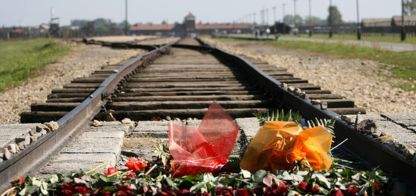Commemorating the 79th Anniversary of the Liquidation of the Romani Camp in Auschwitz
On the 2nd of August at the State Museum and Memorial Site, a solemn event commemorated the 79th anniversary of the liquidation of the so-called "Zigeunerfamilienlager", or the "Romani family camp", at Auschwitz II-Birkenau. The camp was exterminated by the Germans on the night of August 2-3, 1944, during which approximately 4.3 thousand children, women, and men—the last Romani prisoners of the camp—were murdered in gas chambers. The 2nd of August is recognized as the Remembrance Day of the Genocide of Sinti and Roma.
Honoring the Victims
Hundreds of people gathered at the monument commemorating the extermination of Roma and Sinti in the premises of the former German Nazi concentration and extermination camp. They included representatives of state authorities, international organizations, ambassadors and diplomats, politicians, representatives of local authorities, institutions, and museums, who paid tribute to the victims and laid wreaths.
"I am very moved and touched that today - on the occasion of the European Day of Remembrance of the Holocaust of Sinti and Roma - I can speak to you as a representative of our survivors," said Gerda Pohl during the ceremony. "My late husband, Horst Pohl, fought for his life here, in Auschwitz. That is why it is particularly important for me to remember the Holocaust on the Sinti and Roma in this place,” she stressed.
The Voices of Survivors and Representatives
Addressing the issue of discrimination and exclusion, Pohl urged, "We must be careful not to let them start again. […] I urge you with all my heart to fight racism wherever you encounter it." Roman Kwiatkowski, the President of the Association of Roma in Poland, highlighted the long and troubled history of the Roma and Sinti in Europe, and the importance of remembering this history.
Romani Rose, the chairman of the Central Council of German Sinti and Roma, also spoke about the broader issues of racial and social discrimination that still affect the Roma and Sinti communities today. "Auschwitz is a symbol of a turning point in the history of civilization and a crime against humanity committed by the Nazis against 500,000 Sinti and Roma and 6 million Jews," he stated.
Nicola Beer, Vice-President of the European Parliament, underlined the importance of collective memory and warned against the recurrence of totalitarianism, destructive nationalism, and extremism. "Our common responsibility must be to educate subsequent generations about the Holocaust of Sinti and Roma," she emphasized.
The Present and Future of Remembrance
Michał Kamiński, Deputy Marshal of the Senate of the Republic of Poland, connected the historical memory to contemporary realities. He stressed the dangers of rising racism and hatred, stating, "No nation and no civilization is immune from the sin of racism and hatred."
The Prime Minister of Poland, Mateusz Morawiecki, also addressed the commemoration event in a letter that was read by Mateusz Małodziński, the Deputy Voivode of Lesser Poland. "In the heart of Europe, the Roma and Sinti who have lived among us for centuries, being our neighbors, creating their original culture, which was indeed a part of our heritage, were systematically murdered and sent to concentration camps," the letter read.
The History of Roma and Sinti Persecution
Starting from 1933, the Roma, along with Jews, became targets of racially motivated persecutions that included registration, deprivation of certain professional rights, prohibition of mixed marriages, compulsory labor, and finally, placement in concentration camps. The Nazis considered them an "enemy element," with an "inherited" tendency to commit crimes and antisocial behavior.
The atrocities committed during World War II, including the genocide of Sinti and Roma, must never be forgotten. Commemorative events like the one held on August 2nd serve as stark reminders of the horrors of the past and warnings for the future.
Back 
